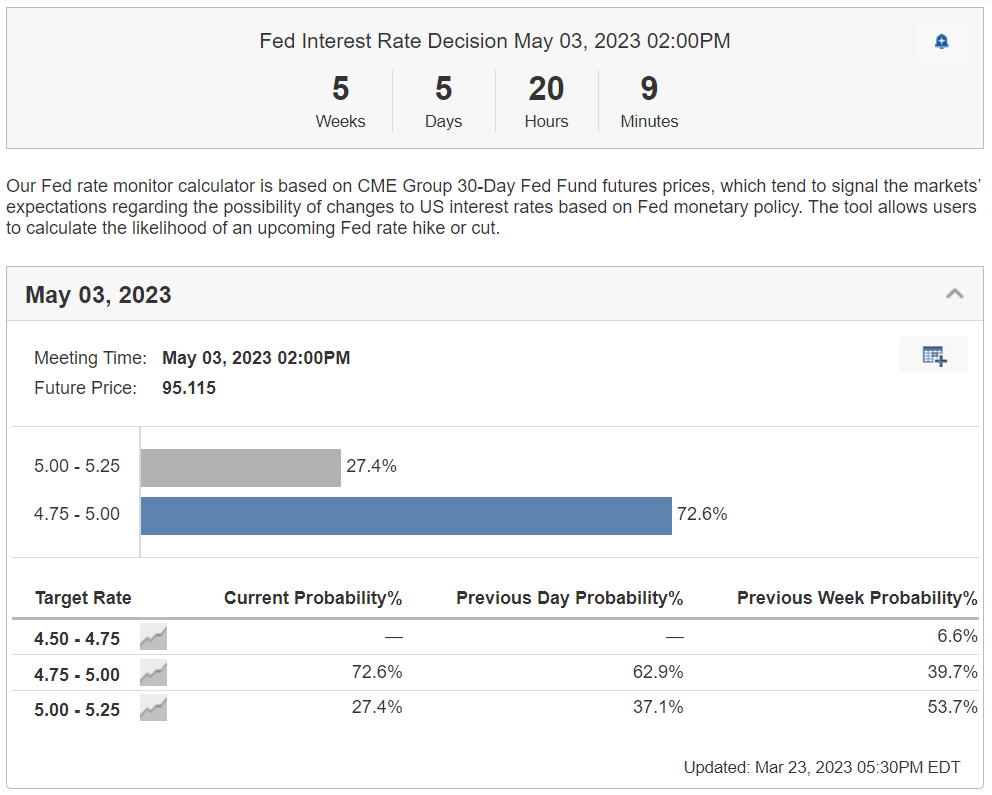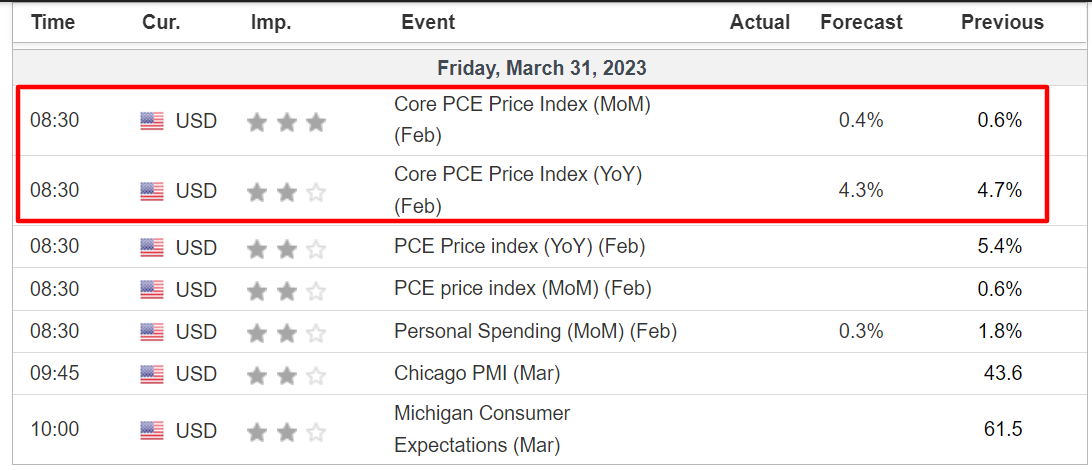Procore stock price target raised to $90 from Goldman Sachs on stabilizing growth
- The stock market faces a crucial test next week, which will help determine the Fed’s next policy move.
- There will be a lot on the line when the latest core PCE price index comes out.
- Bank crisis developments will also be in focus amid lingering fears over the health of U.S. regional banks.
Next week will help determine what the Federal Reserve’s next move will be as the U.S. central bank faces a difficult task of balancing between its ongoing battle against inflation and growing signs of financial instability.
As of Friday morning, markets are pricing in a 72.1% chance of the Fed pausing its rate hikes at its next meeting in May, compared to a 27.9% chance of a 25-basis point increase, according to Investing.com’s Fed Rate Monitor Tool.
Source: Investing.com
The central bank raised its benchmark funds rate by 0.25% in a widely expected move on Wednesday, but its policy statement dropped language about "ongoing increases" would likely be appropriate and replaced it with "some additional" tightening might be possible.
Fed Chair Jerome Powell said in his post-meeting news conference that the central bank was still intent on fighting inflation while also monitoring the extent to which recent turmoil in the banking sector affects the economy.
My personal take is that Powell handled the situation extremely well. He voiced his determination to bring down sticky inflation, while recasting his outlook to a more cautious stance due to stress in the banking system. However, as I mentioned last week, the Fed is at risk of committing a major policy error if it starts to ease policy too soon, which could see inflationary pressures begin to reaccelerate.
With investors growing increasingly certain that the Fed’s monetary tightening campaign could be nearing the end, a lot will be on the line next week.
Will the Fed’s Preferred Inflation Metric Keep Falling?
With Chairman Powell reiterating that his main objective is to bring inflation back under control, next week’s core PCE price index — which is the Fed’s preferred inflation gauge — takes on extra importance.
The U.S. government will release the February report on Friday, March 31, at 8:30 AM ET. As per Investing.com, the core PCE price index is forecast to rise 0.4% m/m, cooling from January’s 0.6% increase. The annualized rate is seen climbing 4.3%, compared to a 4.7% annual pace in the previous month.

Source: Investing.com
While analysts expect both the month-over-month and year-over-year rates to moderate from January’s readings, the numbers will likely show that core PCE prices are not falling fast enough for the Fed to slow its inflation-fighting efforts this year.
The core PCE price index makes it easier to see the underlying inflation trend by excluding the volatile food and energy components. As such, it is closely watched by Fed officials who believe it provides a more accurate assessment of the future direction of inflation.
- Prediction: I believe the PCE price data will underscore how little progress the Fed is making in its effort to bring inflation back down to reasonable levels. A surprisingly higher reading, in which the headline comes in at 4.5% or above, will keep the pressure on the Fed to maintain its fight against inflation.
How Resilient Are U.S. Regional Banks?
Outside of the inflation drama, market participants will continue to be fixated on lingering uncertainties around the health of U.S. regional lenders, where fears of a contagious run on bank deposits remain a big risk.
Shares of small-and-midsized regional banks have been in turmoil for the past three weeks as investors reacted to the swift closures of Silicon Valley Bank and Signature Bank, the second-and third-largest failures in U.S. history.
That has prompted worries about other ticking bombs in the sector.
The focus is now primarily on San Francisco-based First Republic Bank (NYSE:FRC), which has been in continuous talks with other lenders and investment firms about capital infusions. FRC stock has lost roughly 90% of its value this month, making it the worst-performing name among the members of the SPDR S&P Regional Banking ETF (NYSE:KRE), which has fallen 31.4% over the same period.

Speaking in a Senate hearing on Wednesday, Treasury Secretary Janet Yellen told lawmakers that she had not considered or examined the possibility of creating "blanket insurance" to secure uninsured deposits in troubled regional lenders, sparking another selloff in the sector.
She appeared to shift her view somewhat on Thursday, leaving open the prospect that the Treasury could still take future emergency actions in order to prevent broader contagion in the banking sector. “We have used important tools to act quickly to prevent contagion. And they are tools we could use again,” Yellen said in written testimony before a House Appropriations subcommittee.
Last week, Yellen said uninsured deposits would only be guaranteed in the event that it would create systemic risk and significant economic and financial consequences.
- Prediction: A worsening liquidity crisis in the banking sector would underline the view that the Fed will likely pause interest rate hikes for the time being as policymakers assess the current situation.
However, signs that the recent turmoil is being contained to just a few banks without major spillover effect to other embattled regional lenders would suggest that perhaps the worst is behind us. If that were the case, then the market will be forced to reprice rate expectations to reflect additional tightening by the end of summer.
***
If you’re looking for more actionable trade ideas to navigate the current volatility on Wall St., I’ll be hosting a free webinar on Wednesday, March 29 at 10:00 AM ET highlighting where to invest right now using the advice of billionaire investor Warren Buffett.
Disclosure: At the time of writing, I am long on the S&P 500, and the Nasdaq 100 via the SPDR S&P 500 ETF (SPY), and the Invesco QQQ Trust ETF (QQQ). I am also long on the Technology Select Sector SPDR ETF (NYSE:XLK).
I regularly rebalance my portfolio of individual stocks and ETFs based on ongoing risk assessment of both the macroeconomic environment and companies' financials.
The views discussed in this article are solely the opinion of the author and should not be taken as investment advice.

